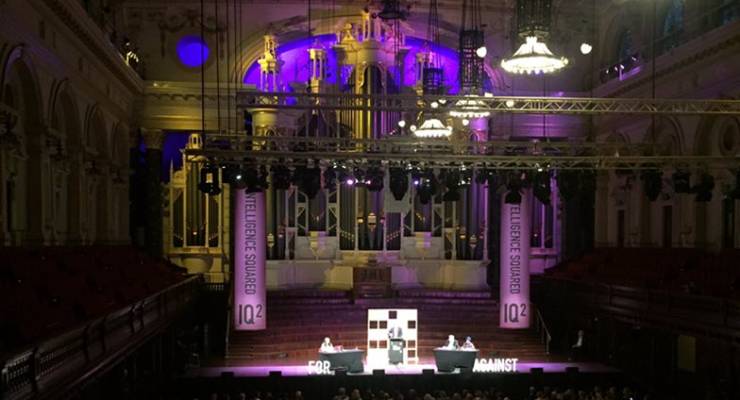
Courtesy of the Ethics Centre
Last night was cheapskate Tuesday. I could have seen a politically correct Hollywood movie for half-price — particularly one starring some pathetic left-wing, anti-Trump, pro-Muslim heart-throb. Instead, I headed to Sydney Town Hall for a mass debate on the topic of whether political correctness (PC) had failed itself.
The debate was hosted by the Ethics Centre. As is often the case with mass debates, few debaters stuck strictly to the topic — but, Chris Kenny did. Kenny was introduced by the chair as the associate editor of “a conservative newspaper” — a strange description for a paper whose editorial writers and columnists often spout ideas on cultural matters more appropriate to the Union of Soviet Socialist Republics.
As the first speaker in the affirmative, Kenny said PC had failed itself. Other speakers focused on how PC had (or hadn’t) failed their community or interests or whatever. But now I’m starting to sound like a high school debating adjudicator, so I’ll stop with this line of interrogation.
Kenny argued PC had become self-defeating, largely because it was no longer based on facts, and therefore led to actions and conclusions that were all out of proportion. The Oz‘s associate editor said that, during the Martin Place siege, the New South Wales police (thanks to PC considerations) gave more priority to shielding Muslims from discrimination, than attacking Man Monis’ “terrorist attack”. Kenny described Man Monis as a “jihadist cleric”.
As I’ve written before, Man Monis was more of a fake sheik than a real one. And while it is true that one expert (presumably a psychiatrist) gave evidence at the inquest on Man Monis’ mental state, describing him as a terrorist — there was hardly consensus on the issue. Under Australian law, it isn’t enough for someone’s actions to terrorise their victims to designate them “terrorist acts”. There has to be political, ideological or religious motive. Were this not the case, thousands of perpetrators of domestic violence would be prosecuted under counter-terror laws. (Kenny also speaks of PC attitudes toward border protection and mentions the existence of a “queue” for refugees. What queue? There is none).
Kenny’s most potent argument — that PC is an invention of the political class, which has divorced them from the “mainstream” — again makes little sense. As first negative speaker, Mikey Robins, noted, Kenny and so many of those going on and on about PC are themselves part of the political class. Indeed, if PC has failed, why do conservatives feel the need to constantly protect us from it?
Kenny noted the irony that PC started out not as a conservative insult of the left, but rather, as a self-mocking phrase between different sections of the left. Kenny and his allies may allege PC to be McCarthyist, but Joe McCarthy wasn’t exactly a card-carrying communist.
Without meaning to sound PC in a sexist sort of way, the ladies were the stand-out debaters of the night — starting with second affirmative Jacinta Nampijinpa Price, the Warlpiri/Celtic Alice Springs councillor, as well as singer and advocate against domestic violence. She resents the fact that PC practitioners keep telling her and her people what they should call themselves. In her neck of the woods, the lack of PC is an indication that people (both black and white) don’t take themselves too seriously. And this is because they have more serious fish to fry.
Price says that PC is like racism — both are based on untruths and stereotypes. PC means that indigenous people, especially women, find it hard to speak about violence from black family members and community folk. In this case, PC can be deadly. As for white racism, Price says she would rather know who the racists are so she can face them head on.
The final speaker was second negative, Tasneem Chopra. (Disclaimer: I’ve known Tasneem since 1985. Also, I’ve always called her Tasneem and that won’t stop here. Of course, that doesn’t mean I agree with Tasneem on everything).
Tasneem says that for many urban women from “ethnic” backgrounds, PC is all they have to protect them from discrimination. PC exposes privilege and bias. “It allows us to call out bigotry, to stand up to dominant voices”. Tasneem called upon Kenny (or Chris, to be fair) to share his experiences of racism. “If you feel the need to be violent or racist, to threaten rape or other assault, your politics is incorrect.”
With this youngish and largely female crowd, the negative side were always going to win the debate. OK, that wasn’t very PC.








Irfan, how many times does it need to be repeated: a Muslim causing havoc in public is ‘a terrorist’ whereas a non-Muslim doing likewise is referred to as ‘the accused’.
Has the motorist who (allegedly) mowed down & killed several pedestrians in Bourke Street Mall been described as a terrorist? No. That’s how it works.
Its tightass Tuesday Irfan. Are you self-censoring. Political correctness gone mad!